Thank You Letter Appreciation
[Your Name]
[Your Address]
[City, State, ZIP Code]
[Email Address]
[Phone Number]
[Date]
[Recipient's Name]
[Recipient's Job Title]
[Company/Organization Name]
[Address]
[City, State, ZIP Code]
Dear [Recipient's Name],
I hope this letter finds you well. I am writing to express my heartfelt gratitude and appreciation for [the reason you are writing the thank-you letter - e.g., the opportunity, assistance, support, guidance, etc.].
I am truly thankful for [specific details about the help, support, or opportunity provided]. Your [knowledge/expertise/mentorship] has been invaluable and has significantly contributed to my personal and professional growth.
Your kindness, patience, and willingness to go above and beyond have left a lasting impression on me. I am deeply grateful for the time you spent [mentoring me/assisting me/working with me] and for sharing your wisdom and experience. Your guidance has been instrumental in helping me overcome challenges and achieve my goals.
I also want to express my gratitude for the warm and inclusive environment that you foster at [Company/Organization Name]. The positive atmosphere and the sense of camaraderie among the team members have made my experience all the more enjoyable and fulfilling.
Please convey my thanks to the entire team for their support and cooperation throughout this journey. It was a pleasure to work with such a dedicated and talented group of individuals.
Once again, thank you for being a wonderful [mentor/manager/colleague/friend]. I genuinely appreciate everything you have done for me, and I look forward to the possibility of working together again in the future.
If there is anything I can do to return the favor or assist you in any way, please do not hesitate to reach out to me. I am more than willing to reciprocate the kindness and support you have shown me.
Thank you for making a positive difference in my life. I am truly grateful.
With sincere appreciation,
[Your Name]
Formal Thank You Letter for Professional Assistance
Subject: Thank You for Your Support
Dear [Recipient Name],
I am writing to express my sincere gratitude for your support and guidance on [specific project or task]. Your expertise and dedication were instrumental in achieving our objectives.
I truly appreciate your time and effort, and I look forward to collaborating with you again in the future.
Sincerely,
[Your Name]
[Your Position]
[Company Name]
Heartfelt Personal Thank You Letter
Subject: A Heartfelt Thank You
Dear [Recipient Name],
I wanted to take a moment to sincerely thank you for [specific reason]. Your kindness and generosity have deeply touched me, and I am genuinely grateful for your support.
Your actions have made a lasting difference, and I will always remember your thoughtful gesture.
Warm regards,
[Your Name]
Quick Appreciation Email
Subject: Thank You!
Hi [Recipient Name],
Just a quick note to say thank you for [specific reason]. Your help was much appreciated!
Thanks again,
[Your Name]
Creative Thank You Letter for Team Effort
Subject: Kudos to the Team!
Dear Team,
I want to extend my heartfelt thanks for your exceptional work on [project name]. Each one of you contributed your unique skills, and the results have been remarkable.
Your dedication and teamwork are truly inspiring, and I am proud to be part of such a talented group.
Best,
[Your Name]
[Position]
Formal Thank You Letter for Client Appreciation
Subject: Thank You for Your Continued Partnership
Dear [Client Name],
We would like to express our sincere appreciation for your continued trust and partnership with [Company Name]. Your support has been vital to our mutual success.
We look forward to maintaining and strengthening our relationship in the future.
Sincerely,
[Your Name]
[Position]
[Company Name]
Funny Appreciation Email
Subject: You’re Awesome!
Hey [Recipient Name],
Just wanted to say a huge thanks for [specific reason]. Honestly, if I could give out medals, you’d get the gold for today!
Appreciate you,
[Your Name]
Informal Thank You Letter to a Friend
Subject: Thanks a Bunch!
Hi [Friend Name],
I really appreciate all the support you’ve given me with [specific reason]. It means a lot to know I can count on you.
Thanks again and looking forward to catching up soon!
Cheers,
[Your Name]
What is a Thank You Letter and Why It Is Important
- A thank you letter is a written expression of gratitude to someone for their support, assistance, or contribution.
- It helps strengthen personal and professional relationships.
- It serves as formal recognition of efforts and can leave a lasting positive impression.
- The purpose ranges from expressing personal gratitude to acknowledging professional contributions.
Who Should Send a Thank You Letter
- Anyone who has received support, help, or a favor can send a thank you letter.
- In professional settings: employees, managers, or organizations sending appreciation to colleagues, clients, or partners.
- In personal settings: friends, family members, or acquaintances expressing gratitude for a kind gesture or assistance.
Whom Should a Thank You Letter Be Addressed To
- The recipient could be an individual, a group, a team, or an organization.
- Can be directed to clients, supervisors, employees, colleagues, friends, family, or mentors.
- For formal letters, address the recipient with their title and full name.
When to Send a Thank You Letter
- After receiving help, support, or guidance.
- Following a professional achievement or completion of a project.
- Post-interview, after receiving mentorship, or after a gift or gesture.
- Anytime you want to acknowledge effort, kindness, or contribution.
How to Write and Send a Thank You Letter
- Identify the reason for writing clearly and specifically.
- Decide on the tone: formal, casual, humorous, heartfelt, or creative.
- Include a greeting, specific acknowledgment, closing remarks, and signature.
- Choose the appropriate medium: printed letter, email, or digital message.
- Review the letter for clarity, grammar, and tone before sending.
Formatting Guidelines for Thank You Letters
- Keep letters concise; one page is sufficient for formal letters, short for emails.
- Tone should match the relationship: professional, friendly, or casual.
- Begin with a greeting, followed by the acknowledgment of support or assistance.
- End with a closing that reiterates gratitude and well wishes.
- For emails, use clear subject lines like “Thank You for Your Support” or “Appreciation for Your Help”.
Requirements and Prerequisites Before Sending
- Ensure you know the specific reason for writing and the impact of the recipient's help.
- Gather relevant details, such as project names, dates, or events to mention.
- Decide on the style and tone suitable for the recipient and situation.
- Have accurate contact information or mailing address for delivery.
Common Mistakes to Avoid in Thank You Letters
- Using generic or vague expressions instead of specific reasons.
- Overly long letters that dilute the message of gratitude.
- Neglecting proper tone, either too casual for formal contexts or too stiff for personal letters.
- Forgetting to proofread for grammar, spelling, and clarity.
- Sending letters too late, losing the immediacy of appreciation.
Elements and Structure of a Thank You Letter
- Subject line (for emails) or heading for formal letters.
- Greeting addressing the recipient.
- Introduction stating the purpose of the letter.
- Acknowledgment specifying the help, support, or favor.
- Closing remarks with additional gratitude or well wishes.
- Signature with name, and position or relationship if formal.
- Optional attachments or references if relevant.
After Sending a Thank You Letter: Follow-Up
- For formal letters, ensure the recipient received it by confirmation or acknowledgment.
- Reflect on the interaction and maintain a positive relationship.
- For ongoing projects or professional relationships, continue communication to reinforce goodwill.
Tips and Best Practices for Thank You Letters
- Be specific about the reason for gratitude.
- Tailor the tone to the recipient and context.
- Send the letter promptly to maintain relevance.
- Use professional formatting for formal letters and casual language for friends or peers.
- Keep a copy for personal records or company files when professional.
FAQ About Thank You Letters
- Q: Can a thank you letter be sent digitally?
A: Yes, email or messaging platforms are acceptable, especially for quick communication. - Q: Is it okay to use humor in a thank you letter?
A: Humor is appropriate in informal settings but should be avoided in formal professional letters. - Q: How long should a thank you letter be?
A: Typically, one page or a short, concise email is sufficient. - Q: Should I always include a specific example?
A: Yes, mentioning the specific action or support makes the letter more meaningful.

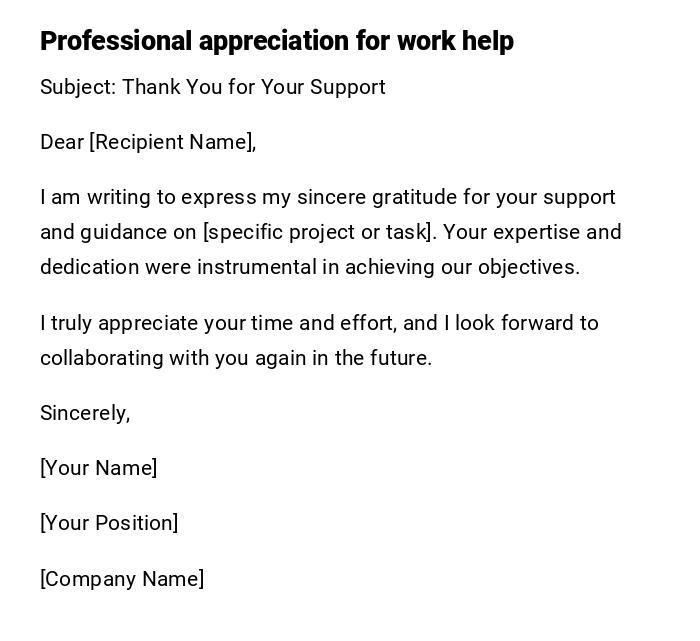
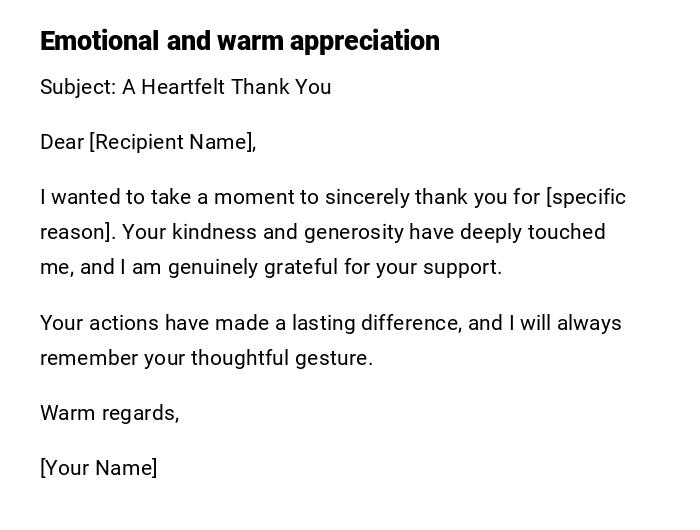
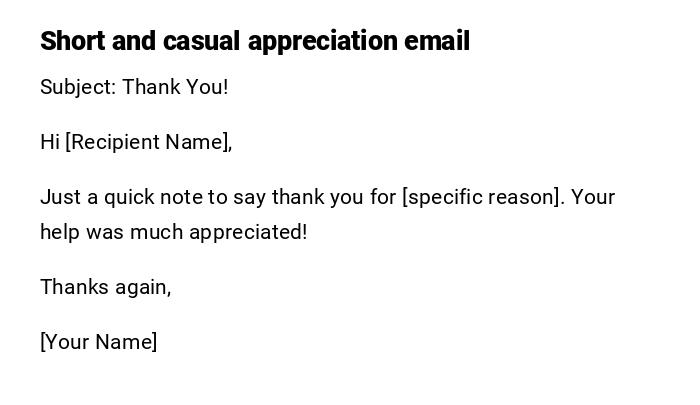
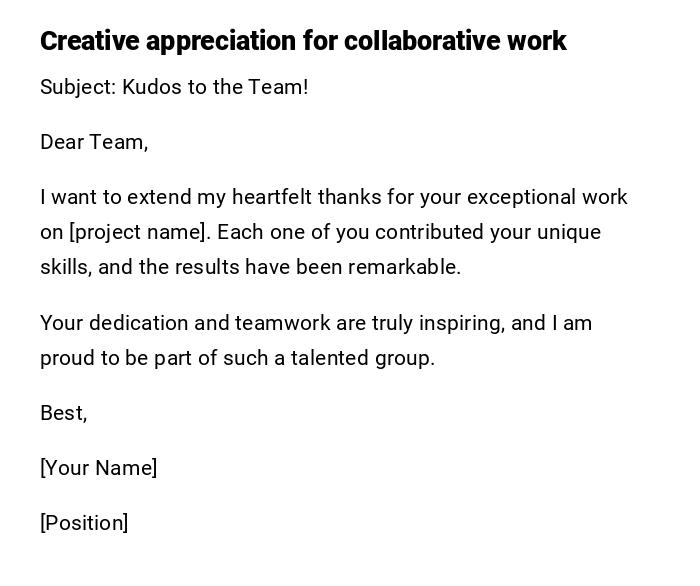
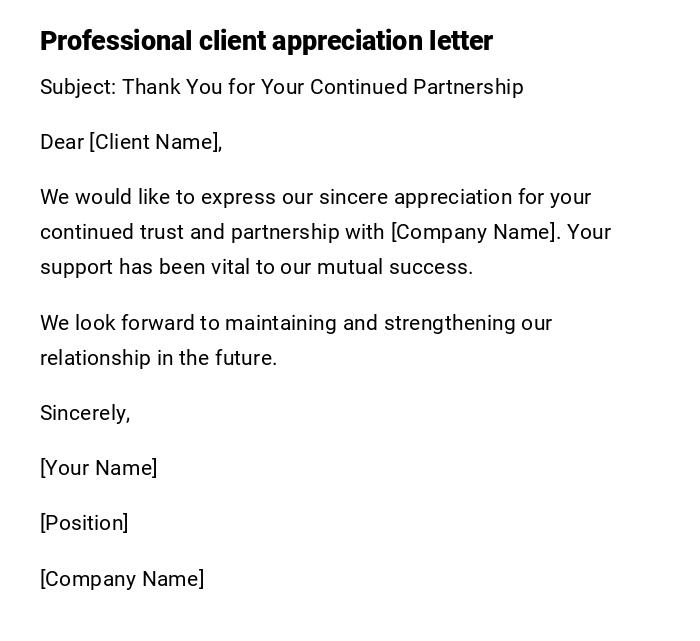
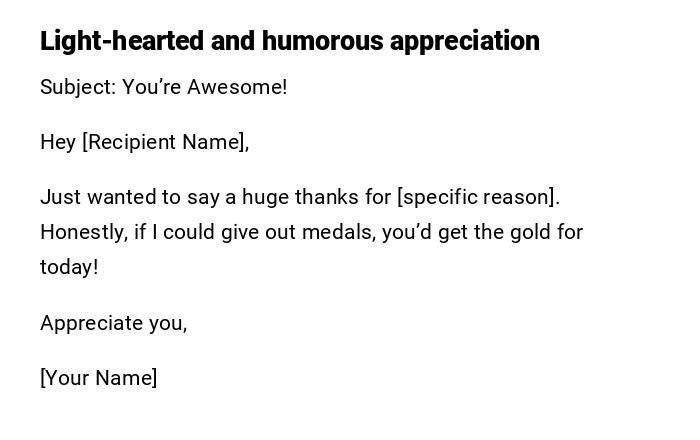
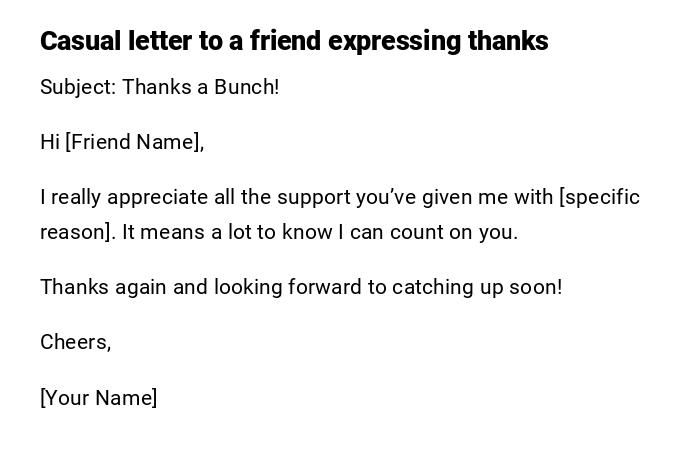

 Download Word Doc
Download Word Doc
 Download PDF
Download PDF